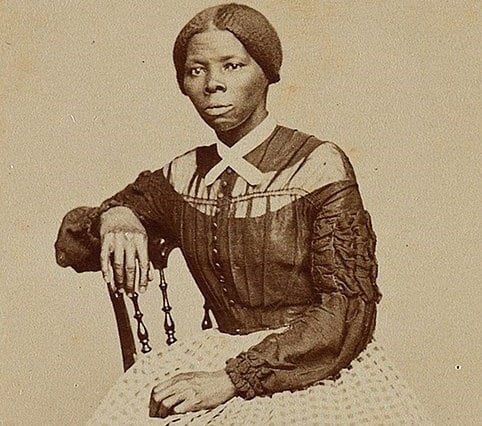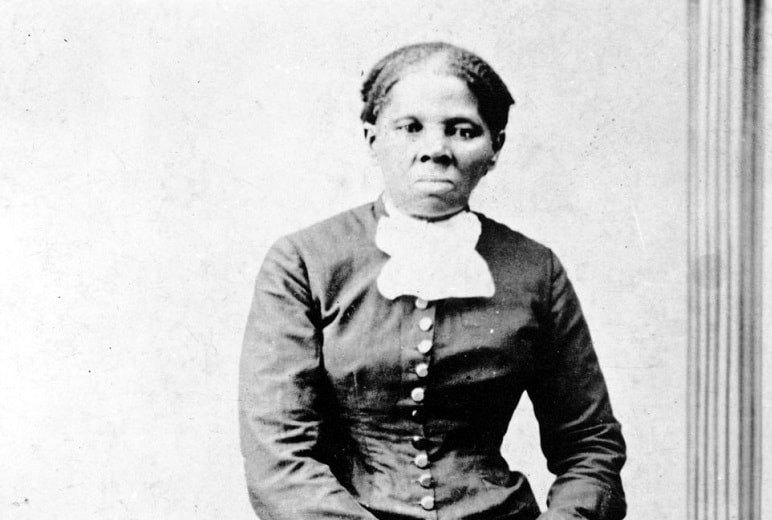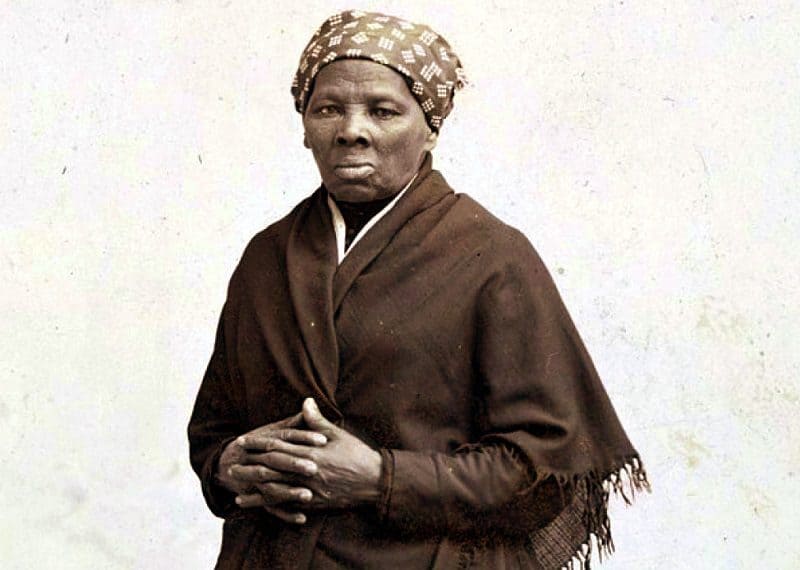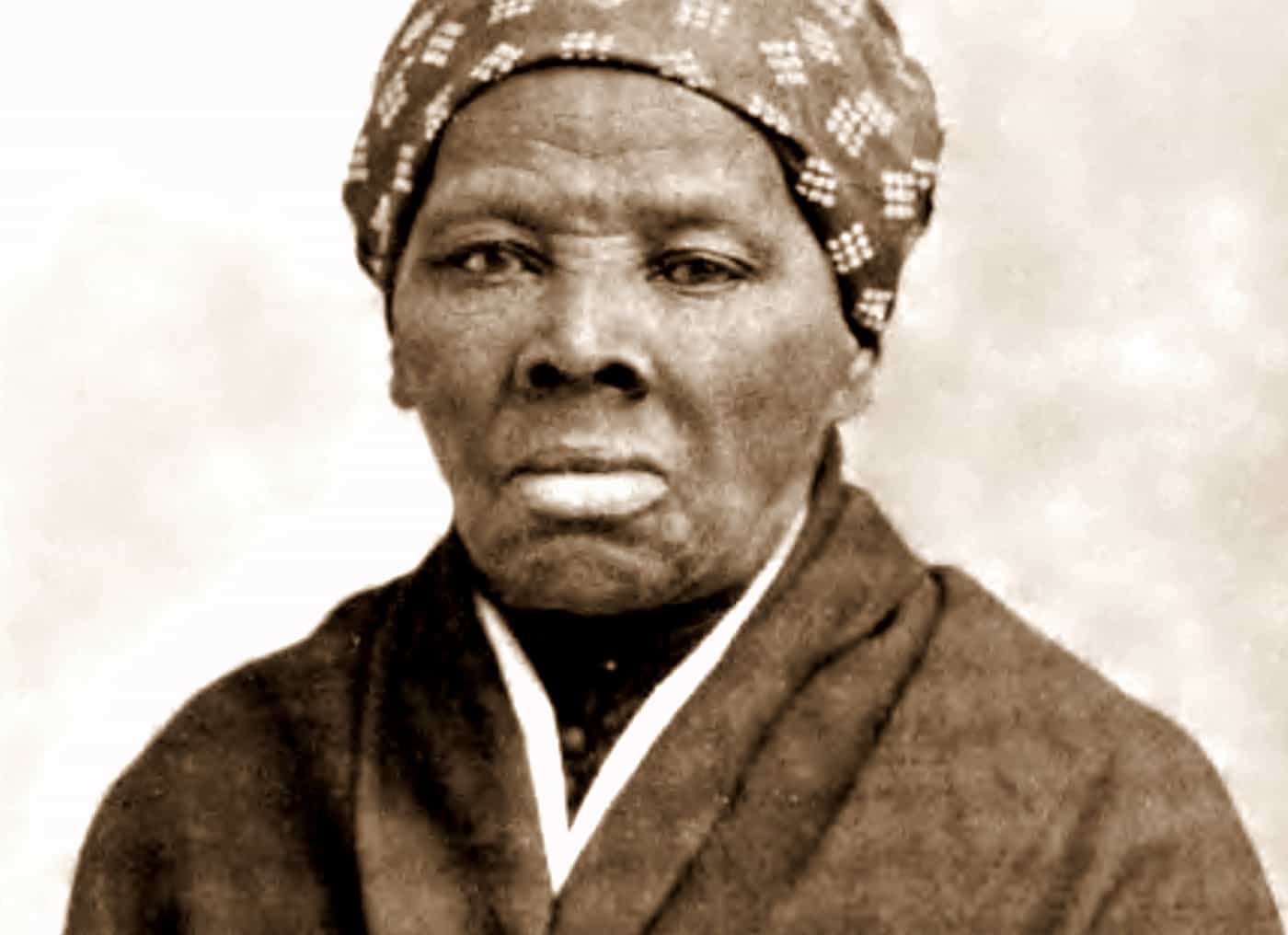Last Updated on February 22, 2024
The time of slavery was a dark period in history for African-Americans in the United States. By the 19th century, the states were divided over the issue of slavery. The North supported abolition and the South demanded for slave labor for its booming cotton industry.
Harriet Tubman was one of the abolitionists. An escaped slave from Maryland, Tubman became an important historical figure because of her missions to rescue other slaves, her role in the Civil War, and her involvement in the women’s suffrage movement.
Early Life in Slavery

Harriet Tubman was born Araminta Ross in Maryland sometime around 1820. Various sources differ as to when she was actually born. Tubman herself did not know the exact year of her birth. She was the fifth child out of nine born to slaves Harriet Green and Ben Ross.
Araminta, or Minty, was hired out to other households starting at the age of 5 to work as a nursemaid. She stayed up nights looking after the baby. Whenever the baby cried, Tubman was whipped. She endured cruelty under the hands of her owners.
She suffered a severe head injury when she refused to help a master punish a fellow slave for leaving without permission. The master threw a heavy metal weight at the fleeing slave, but missed and hit Tubman instead. Tubman did not receive medical care for her injury, and as a result suffered seizures, headaches, sleeping spells, and vivid dreams for the rest of her life.
She married a free African-American named John Tubman in 1844. She adopted her mother’s first name and her husband’s last name, possibly to prepare for her escape. Sadly, her husband did not support her plan and she set out alone.
Escape from Slavery

Around 1849, Tubman made her escape. Aided by the Underground Railroad, a network of people and places that helped slaves escape, she finally reached Pennsylvania. The Underground Railroad consisted of abolitionists, free African-Americans, and other activists who provided safe houses and escape routes for slaves.
Tubman’s harsh childhood and experiences in captivity strengthened her resolve to free her people, especially her family. She felt that without family, her freedom meant nothing. She returned several times to Maryland to help other slaves escape.
Tubman used creative strategies in her missions. Using the North Star to guide her journeys, she traveled by night. Her journeys were sometimes delayed because she needed to hide from slave catchers. To minimize the risk of being seen and caught, she usually traveled during fall and winter.
Tubman made around nineteen rescue missions over eleven years and helped about 300 slaves escape. Because of this, abolitionist William Lloyd Garrison nicknamed her “Moses,” in reference to the biblical prophet in the book of Exodus who led the enslaved Hebrews out of Egypt.
Role in the Civil War

The American Civil War erupted in April 1861 over the issue of slavery. Tubman assisted the Union’s cause, which she saw as important in the abolition of slavery. She initially served as a nurse for sick soldiers.
In 1863, after President Abraham Lincoln issued the Emancipation Proclamation, Tubman’s role in the war went from nurse and cook to scout and spy. She led 150 black soldiers in the Combahee River Raid, and freed more than 750 slaves. She was the first woman to lead such an armed attack in the war.
The Civil War ended with the surrender of the Confederate army in 1865, followed by the abolition of slavery. Tubman returned to New York, where she had purchased a small plot of land in Auburn.
Post-War Life
Tubman worked several jobs to support her family in Auburn. Despite her heroism during the Civil War, she continued to live in poverty. She did not receive pension from the U.S. government. It wasn’t until 1899, after she petitioned Congress for benefits, that the government finally recognized her role in the war and provided her a monthly pension.
When slavery was abolished in the U.S., Tubman then campaigned for women’s right to vote. She spoke out in favor of women’s rights, stressing the equality of men and women using her own experiences.
She died in 1913 of pneumonia, poor but surrounded by family and friends.
Legacy

Tubman’s constant support for the welfare of others has earned her the respect and admiration of people all over the world. She became an important icon of the American struggle for civil rights and equality. Dozens of monuments and schools are named after her, including the Harriet Tubman Underground Railroad National Monument in 2013.
Harriet Tubman went through years of extreme hardship and spent the rest of her life trying to relieve the suffering of others. She is widely regarded as a hero of African-Americans in her fight against slavery, and of women in her campaign for their rights. Today, Tubman is considered a role model for her courage, strength, and never-ending commitment to advance the rights of others.
Here are several of the most unforgettable quotes from Harriet Tubman.
Harriet Tubman Quotes
“When I found I had crossed that line, I looked at my hands to see if I was the same person.” – Harriet Tubman
“I was the conductor of the Underground Railroad for eight years, and I can say what most conductors can’t say — I never ran my train off the track and I never lost a passenger.” – Harriet Tubman
“I grew up like a neglected weed, – ignorant of liberty, having no experience of it. Then I was not happy or contented.” – Harriet Tubman
“I said to the Lord, I’m going to hold steady on to you, and I know you will see me through.” – Harriet Tubman
“God’s time is always near. He set the North Star in the heavens; He gave me the strength in my limbs; He meant I should be free.” – Harriet Tubman
“Always remember, you have within you the strength, the patience, and the passion to reach for the stars to change the world.” – Harriet Tubman
“If you hear the dogs, keep going. If you see the torches in the woods, keep going. If there’s shouting after you, keep going. Don’t ever stop. Keep going. If you want a taste of freedom, keep going.” – Harriet Tubman
“Twant me, ’twas the Lord. I always told him, ‘I trust to you. I don’t know where to go or what to do, but I expect you to lead me,’ and He always did.” – Harriet Tubman
“I had reasoned this out in my mind; there was one of two things I had a right to, liberty or death; if I could not have one, I would have the other; for no man should take me alive.” – Harriet Tubman
“I am at peace with God and all mankind.” – Harriet Tubman
“In my mind, I see a line. And over that line, I see green fields and lovely flowers and beautiful white women with their arms stretched out to me over that line, but I can’t seem to get there no-how. I can’t seem to get over that line.” – Harriet Tubman
“I freed a thousand slaves. I could have freed a thousand more if only they knew they were slaves.” – Harriet Tubman
“I had crossed the line. I was free; but there was no one to welcome me to the land of freedom. I was a stranger in a strange land.” – Harriet Tubman
“I think slavery is the next thing to hell. If a person would send another into bondage, he would, it appears to me, be bad enough to send him into hell if he could.” – Harriet Tubman
“Now I’ve been free, I know what a dreadful condition slavery is. I have seen hundreds of escaped slaves, but I never saw one who was willing to go back and be a slave.” – Harriet Tubman
“I have heard their groans and sighs, and seen their tears, and I would give every drop of blood in my veins to free them.” – Harriet Tubman
“And I prayed to God to make me strong and able to fight, and that’s what I’ve always prayed for ever since.” – Harriet Tubman
“Oh, Lord! You’ve been with me in six troubles, don’t desert me in the seventh!” – Harriet Tubman
“There are two things I’ve got a right to, and these are, Death or Liberty – one or the other I mean to have. No one will take me back alive; I shall fight for my liberty, and when the time has come for me to go, the Lord will let them, kill me.” – Harriet Tubman
“I prayed all night long for my master. Till the first of March; and all the time he was bringing people to look at me, and trying to sell me. I changed my prayer. First of March I began to pray, ‘Oh Lord, if you am not never going to change that man’s heart, kill him, Lord, and take him out of the way’.” – Harriet Tubman
“I can’t die but once.” – Harriet Tubman
“Stop searching for happiness in the same place you lost it. Change is not dismantling the old, it’s building the new.” – Harriet Tubman
“I would fight for my liberty so long as my strength lasted, and if the time came for me to go, the Lord would let them take me.” – Harriet Tubman
“You’ll be free or die!” – Harriet Tubman
“As I lay so sick on my bed, from Christmas till March, I was always praying for poor ole master. ‘Pears like I didn’t do nothing but pray for ole master. ‘Oh, Lord, convert ole master;’ ‘Oh, dear Lord, change that man’s heart, and make him a Christian.’” – Harriet Tubman
“I never had anything good, no sweet, no sugar; and that sugar, right by me, did look so nice, and my mistress’s back was turned to me while she was fighting with her husband, so I just put my fingers in the sugar bowl to take one lump, and maybe she heard me, for she turned and saw me. The next minute, she had the rawhide down.” – Harriet Tubman
“I think there’s many a slaveholder’ll get to Heaven. They don’t know better. They acts up to the light they have.” – Harriet Tubman
“Read my letter to the old folks, and give my love to them, and tell my brothers to be always watching unto prayer, and when the good old ship of Zion comes along, to be ready to step aboard.” – Harriet Tubman
“I had two sisters carried away in a chain-gang – one of them left two children. We were always uneasy.” – Harriet Tubman
“In my dreams and visions, I seemed to see a line, and on the other side of that line were green fields, and lovely flowers, and beautiful white ladies, who stretched out their arms to me over the line, but I couldn’t reach them no-how. I always fell before I got to the line.” – Harriet Tubman
“Most of those coming from the mainland are very destitute, almost naked. I am trying to find places for those able to work, and provide for them as best I can, so as to lighten the burden on the Government as much as possible, while at the same time they learn to respect themselves by earning their own living.” – Harriet Tubman
“’Pears like my heart go flutter, flutter, and then they may say, ‘Peace, Peace,’ as much as they likes – I know it’s goin’ to be war!” – Harriet Tubman
“Quakers almost as good as colored. They call themselves friends and you can trust them every time.” – Harriet Tubman
“I’ve heard ‘Uncle Tom’s Cabin’ read, and I tell you Mrs. Stowe’s pen hasn’t begun to paint what slavery is as I have seen it at the far South. I’ve seen de real thing, and I don’t want to see it on no stage or in no theater.” – Harriet Tubman
“Never wound a snake; kill it.” – Harriet Tubman
“The majority of slaves struggled against this tide of indifference to their desires. They engineered love matches and cemented unions with ceremonies.” – Harriet Tubman
“Marriages among slaves could be grand and festive.” – Harriet Tubman
“Slave parents lived in abject terror of separation from their children. This fear, perhaps more than any other aspect of the institution, revealed the deeply dehumanizing horror of slavery.” – Harriet Tubman
“Every great dream begins with a dreamer.” – Harriet Tubman
“There was such a glory over everything; the sun came like gold through trees, and over the fields, and I felt like I was in Heaven.” – Harriet Tubman

